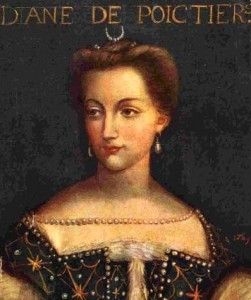January 5, 1589: Hell Gets a Den Mother
On this day in 1589, ten thousand French foodtasters were thrown out of work. Catherine de Medici died and the people no longer felt terrified of eating. Ironically, Catherine was credited with introducing haute cuisine to France. Of course, the ulterior purpose of delicious food is to disguise the taste of any surprise ingredients.
In his novels, Alexandre Dumas has the Queen Mother finding the most remarkable ways to poison people. Jeanne de Navarre, the mother of the future Henri IV, shouldn’t have worn those gift gloves from Catherine. Henri of Navarre receives a book from his loving mother-in-law. Unfortunately, so the novel relates, King Charles IX sees the book and is the first (and last) to read it. Guess what the sticky substance on the pages was? At least, Charles wasn’t Catherine’s favorite son. You’d have thought that Catherine would have applied her culinary skills to the St. Bartholomew’s Massacre. She probably couldn’t trust French waiters to get the orders right. “Was Admiral Coligny supposed to get the poisson or the poison?”
Even discounting Dumas’ literary license, Catherine was infamous. Ruling through her weak and incompetent sons, her policies were intrigue and treachery as she presided over a France rent by religious and civil wars. Who but Catherine would use a wedding as an invitation to a massacre? Her Protestant guests on St. Bartholomews Day certainly could have complained how Paris treats tourists. Yet her son-in-law and frequent target Henri IV said “I am surprised that she never did worse.” And that was a compliment!
If one can justify a monster, Caterina Maria Romula di Lorenzo de’ Medici had a pitiful life. Within her weeks of her birth in 1519 she was an orphan, her mother succumbing to 16th century medicine and her father to syphilis. Yet, as a legitimate de Medici–a fairly rare species–the infant was an invaluable asset in the family’s ambitions. To quote Luther “the de Medicis had more money than God” but Florence and Tuscany, however charming, did not give the family any great political or military weight. Buying a papal election or two did enhance the Medici name and influence, but a dynastic marriage could further strengthen the Florentine family with a powerful ally. It just so happened that the King of France needed money and he had an available son.
So, at the age of 12, Catherina became Catherine and the Duchess d’Orleans. While dynastic marriages are usually loveless, the relationship between Catherine and her husband Henri was especially callous. Her dowry was much more alluring than she was, and Henri never hid his disdain. Royal males were permitted infidelity, but a form of etiquette was still expected. At court, the wife was supposed to have precedence over the mistress. Henri dispensed with that courtesy. As duchess, then princess and even queen, Catherine was humiliated by her husband. However, Henri did pay one form of attention to his wife: and the result was nine children–including four sons. They would be Catherine’s immediate solace and her eventual revenge.
Although Henri’s chivalry did not extend to his wife, he did love to joust. In that pursuit, one day in 1559 his eye stopped a lance. That proved an unhealthy tactic, and Catherine now was the Queen Mother of Francis II. However, she was not yet the power behind the throne. The new king was–at age 15–already married and henpecked. His 17 year-old wife, Mary of Scotland, towered over him; and if the physical domination was not enough, her ambitious French uncles–the de Guises–were eager to guide the royal couple. If the Guises did not give Catherine a second thought, at least they showed her more courtesy than her husband ever had. As Queen Mother, she was given a place in the regents’ council and her name was included in royal proclamations.
Her life as a pampered cipher lasted a year. Francis II died of an ear abscess at the age of 16. Of course, Dumas suggests the Catherine “supervised” his medical treatment. However cynical that seems, Catherine was not incapacitated by grief. Young, widowed Mary was, for all the diplomatic euphemisms, expelled to Scotland (where the gallicized Catholic really endeared herself to her Calvinist subjects–but you know this story); and the new king was the ten-year-old Charles IX. So the reign of Catherine de Medici began.
If she had some satisfaction in her power, she was not having fun. France was trying to stave off domination by the Hapsburgs, the Guise clan craved power and possibly the throne itself, the Protestants agitated for official tolerance threatening civil war and possibly the throne itself. To protect her son, his throne and kingdom, the Queen Mother was prepared to do anything. Intrigue, treachery, even assassination were justifiable means of politics. (In fact, a penurious Florentine bureaucrat had written a book on that subject and dedicated it to her wastrel father.) To maintain the dynasty through those challenges, she would make and betray alliances. First, she might side with the Huguenots, then with their Catholic nemesis, then back to the Huguenots, whenever and wherever the advantage lay.
Perhaps she meant to set aside power when Charles IX became a mature adult; however, he never did although he lived to be 24. As for her next son, Henri III had caprices rather capacity; so long as he had the luxuries, he ceded the responsibilities to his mother. Catherine eventually realized that the dynasty was doomed. French law only permitted males on the throne, and the Valois were running out of them. Charles IX only had a daughter. Henri III had neither the proclivities nor the diligence to produce any heirs. But Catherine continued to intrigue, bargain and fight because France needed someone to do it, and none of her sons had the capacity.
Within a few months of Catherine’s death, Henri III was assassinated and the Valois dynasty ended. Her son-in-law would intrigue, bargain and fight to become Henri IV and founder of the Bourbon dynasty. He won a kingdom that–against the odds–Catherine de Medici had preserved. “I am surprised that she did not do worse.”

